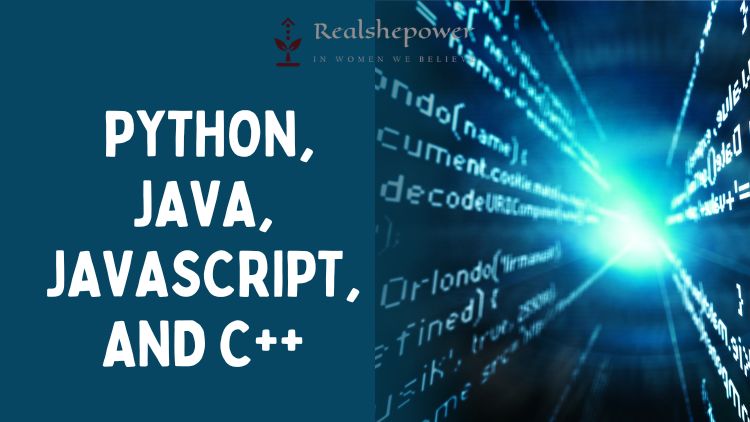A Comparative Analysis of Python, Java, JavaScript, and C++


Table of Contents
Introduction
When it comes to programming languages, there is a wide range to choose from. Each language has its strengths and weaknesses and is suitable for different purposes. In this article, we will compare and contrast four popular programming languages: Python, Java, JavaScript, and C++. We will examine the features of each language, their pros and cons, and their suitability for different use cases.
Python
Python is a high-level, interpreted programming language that is easy to learn and use. It has a simple syntax that makes it popular among beginners and experienced programmers alike. Python is an open-source language, which means that it is free to use and has a large community of developers contributing to its development.
Pros:
- Easy to learn: Python’s simple syntax makes it easy to learn, and it is an excellent choice for beginners.
- Large community: Python has a large community of developers, which means that there are many resources available to help you learn and use the language.
- Versatile: Python can be used for a wide range of applications, including web development, data analysis, machine learning, and more.
Cons:
- Slow performance: Python is an interpreted language, which means that it can be slower than compiled languages like C++.
- Not suitable for high-performance applications: Python’s slow performance means that it is not suitable for high-performance applications like real-time systems or high-speed trading systems.
Java
Java is a popular programming language that is widely used for developing web applications, mobile apps, and desktop applications. Java is a compiled language, which means that it is faster than interpreted languages like Python. Java is also an object-oriented language, which means that it is well-suited to complex applications.
Pros:
- High performance: Java is a compiled language, which means that it can be faster than interpreted languages like Python.
- Platform independence: Java is platform-independent, which means that it can run on any operating system.
- Object-oriented: Java is an object-oriented language, which means that it is well-suited to complex applications.
Cons:
- Steep learning curve: Java has a steep learning curve, and it can be challenging for beginners to learn.
- Verbose syntax: Java’s syntax can be verbose, which means that it can take longer to write code in Java than in other languages.
- Memory management: Java’s automatic memory management can lead to performance issues if not managed properly.
Read: How to Start Coding: A Step-by-Step Approach for Beginners

JavaScript
JavaScript is a programming language that is widely used for web development. It is an interpreted language that runs in the browser, which means that it is fast and efficient. JavaScript is an object-oriented language that supports functional programming, making it a versatile language for web development.
Pros:
- Wide adoption: JavaScript is widely adopted, and there are many resources available to help you learn and use the language.
- Easy to learn: JavaScript is easy to learn, and it is an excellent choice for beginners.
- Versatile: JavaScript can be used for a wide range of applications, including web development, mobile app development, and more.
Cons:
- Security issues: JavaScript’s ability to run in the browser can lead to security issues if not properly managed.
- Asynchronous programming: Asynchronous programming in JavaScript can be challenging for beginners to understand.
- Browser compatibility: JavaScript’s browser compatibility issues can lead to problems if not properly managed.
C++
C++ is a high-performance programming language that is widely used for developing operating systems, games, and other applications that require high performance. C++ is a compiled language that is known for its speed and efficiency.
Pros:
- High performance: C++ is a compiled language that is known for its speed and efficiency.
- Low-level programming: C++ is a low-level programming language, which means that it gives programmers direct control over the computer’s hardware, making it suitable for developing operating systems and other system-level applications.
- Strong typing: C++ has strong typing, which means that it is less prone to errors than languages with weak typing.
Cons:
- Steep learning curve: C++ has a steep learning curve, and it can be challenging for beginners to learn.
- Memory management: C++ requires manual memory management, which can be challenging and error-prone.
- Verbose syntax: C++’s syntax can be verbose, which means that it can take longer to write code in C++ than in other languages.
Also Read: How Will Technology Change In The Future? 5 Key Areas to Watch Out For

Comparison
Now that we have examined the features, pros, and cons of each language, let’s compare them based on their suitability for different use cases.
Web Development:
For web development, both Python and JavaScript are popular choices. Python’s Django and Flask frameworks make it easy to build web applications quickly, while JavaScript’s React and Angular frameworks make it easy to create interactive web applications.
Mobile App Development:
For mobile app development, Java and JavaScript are popular choices. Java is the language used to develop Android apps, while JavaScript can be used with frameworks like React Native to develop cross-platform mobile apps.
System-level Development:
For system-level development, C++ is the most popular choice. It gives programmers direct control over the computer’s hardware, making it suitable for developing operating systems, games, and other system-level applications.
Data Science and Machine Learning:
For data science and machine learning, Python is the most popular choice. Its large collection of libraries and frameworks, such as NumPy, Pandas, and TensorFlow, make it easy to perform complex data analysis and machine learning tasks.
Conclusion
Each programming language has its strengths and weaknesses, and the choice of language depends on the specific requirements of the project. Python is a great choice for beginners and for applications that require versatility. Java is a good choice for high-performance applications that require platform independence. JavaScript is a popular choice for web development and mobile app development. C++ is a great choice for system-level development and for applications that require high performance. By understanding the features, pros, and cons of each language, you can make an informed decision about which language to use for your project.
FAQs

What is Python?
Python is a high-level, interpreted programming language that is easy to learn and widely used for web development, scientific computing, data analysis, and machine learning.
What is Java?
Java is a general-purpose, object-oriented programming language that is widely used for building enterprise applications, Android mobile apps, and other high-performance applications.
What is JavaScript?
JavaScript is a scripting language that is widely used for creating interactive web applications, building serverless applications, and developing mobile apps using frameworks like React Native.
What is C++?
C++ is a general-purpose, high-level programming language that is widely used for developing operating systems, games, and other system-level applications that require direct control over hardware.
Which language should I learn first?
The choice of language depends on your specific needs and goals. If you are interested in web development, Python or JavaScript might be a good place to start. If you are interested in developing Android apps, Java might be a good choice. If you are interested in system-level development, C++ might be a good option. Ultimately, it’s up to you to decide which language to learn first.
What are some popular frameworks for each language?
Some popular frameworks for Python include Django and Flask for web development, NumPy and Pandas for data analysis, and TensorFlow and PyTorch for machine learning. For Java, popular frameworks include Spring for building enterprise applications, Android SDK for developing Android apps, and Hibernate for database management. For JavaScript, popular frameworks include React, Angular, and Vue for building web applications and React Native for developing mobile apps. For C++, popular frameworks include Qt for building desktop applications and Unreal Engine for developing games.
What are the job prospects for each language?
All four languages have strong job prospects, with demand for skilled programmers in each language. Python and Java are particularly in-demand for enterprise applications and data science, while JavaScript is in high demand for web development and mobile app development. C++ is often used in the gaming industry and in other system-level applications. Ultimately, the job prospects depend on the specific industry and job market in your area.
Is Python easy to learn?
Python is considered to be one of the easiest programming languages to learn, thanks to its simple syntax and large community of users. Many beginners start with Python because it is straightforward and easy to use, making it a great language for learning programming fundamentals.
What industries use Java?
Java is used in a variety of industries, including finance, healthcare, e-commerce, and telecommunications. Many large enterprises use Java for building high-performance, scalable applications that can handle large amounts of data and traffic.
What is Node.js?
Node.js is a runtime environment for JavaScript that allows developers to run JavaScript code on the server side. This makes it possible to build full-stack web applications entirely in JavaScript, from the front-end to the back-end.
Is C++ still relevant?
C++ is still a highly relevant programming language, especially for system-level development and high-performance applications. Many popular video games and operating systems are built using C++, and it remains a popular choice for developers who require direct control over hardware.
What are some popular IDEs for each language?
For Python, popular IDEs include PyCharm, Spyder, and Jupyter Notebook. For Java, popular IDEs include Eclipse, IntelliJ IDEA, and NetBeans. For JavaScript, popular IDEs include Visual Studio Code, WebStorm, and Atom. For C++, popular IDEs include Visual Studio, Code::Blocks, and Eclipse.
Is JavaScript only for front-end development?
No, JavaScript can be used for both front-end and back-end development. With the rise of Node.js, it is now possible to build full-stack web applications entirely in JavaScript, from the front-end to the back-end.
What are some benefits of using Python?
Python is known for its simplicity, ease of use, and readability. It has a large collection of libraries and frameworks that make it easy to perform complex tasks, such as data analysis, machine learning, and web development. It is also highly versatile, making it suitable for a wide range of applications.
What are some benefits of using C++?
C++ is known for its high performance, direct hardware access, and strong typing. It is a great choice for building high-performance applications that require direct control over hardware, such as operating systems and video games. It is also highly portable, making it possible to write code that can run on multiple platforms.
Also Read: How to Use Open-Source Big Data Tools for Business Intelligence and Analytics

You can now write for RSP Magazine and be a part of the community. Share your stories and opinions with us here.
